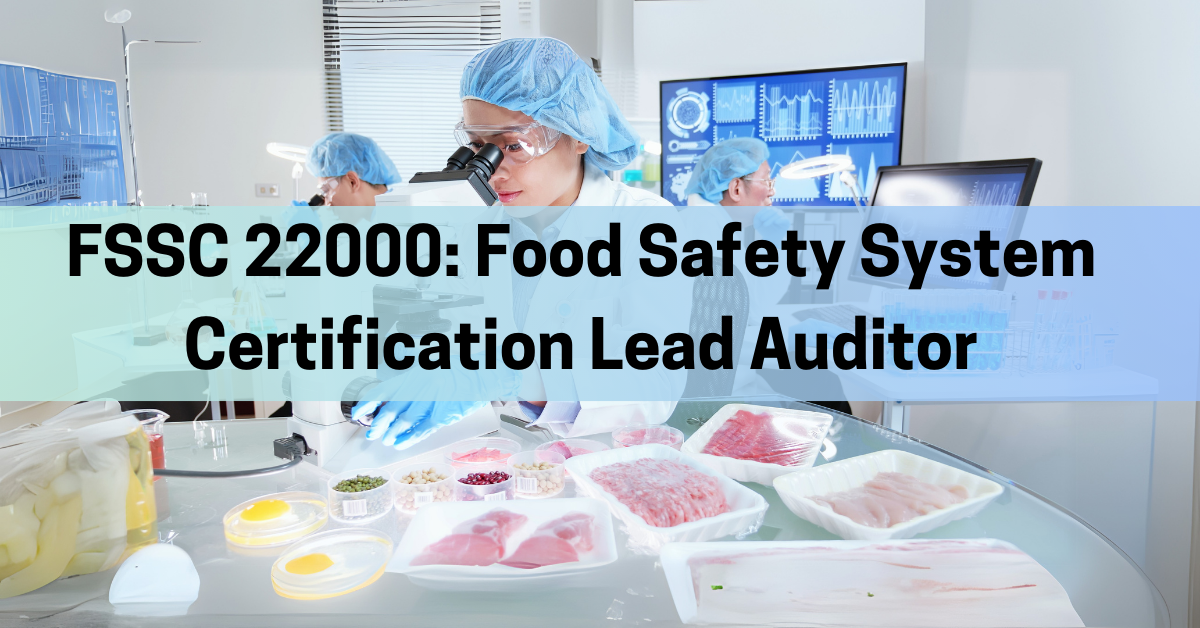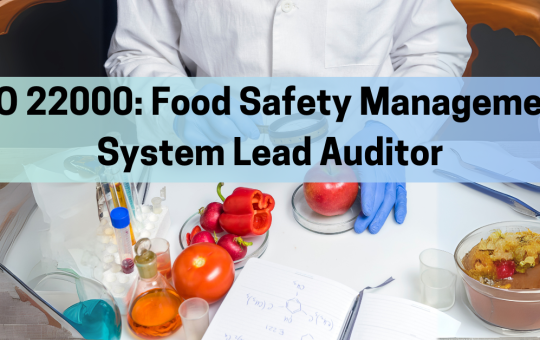
FSSC 22000 Food Safety System Certification Lead Auditor
- Global Recognition: Become a certified Lead Auditor in FSSC 22000, a globally recognized standard for food safety management systems.
- Increased Career Opportunities: Open doors to higher-level auditing, consultancy, and managerial roles in the food industry.
- Comprehensive Knowledge: Gain expertise in the application of FSSC 22000 standards, HACCP principles, and food safety risk management techniques.
- Practical Skills: Learn how to conduct effective audits, identify non-conformities, and recommend corrective actions to improve food safety systems.
- Contribute to Food Safety: Play a key role in ensuring that food products meet regulatory and consumer safety expectations, safeguarding public health globally.
- Understand the structure and requirements of FSSC 22000 and its application in food safety management.
- Plan, perform, and lead FSSC 22000 audits for food businesses, ensuring compliance with international food safety standards.
- Identify gaps in food safety management systems and recommend corrective actions.
- Evaluate the effectiveness of food safety processes and risk management strategies.
- Integrate HACCP and PRPs (Pre-Requisite Programs) into food safety audits.
- Report audit findings and develop detailed audit reports.
- Lead audit teams effectively, ensuring compliance with ethical auditing practices and ISO standards.
- Introduction to FSSC 22000 and Food Safety Management Systems
- Overview of food safety management and the role of FSSC 22000.
- Key principles of FSSC 22000 and its integration with ISO 22000 and ISO 22003.
- Understanding the structure of a food safety management system (FSMS).
- The Role of a Lead Auditor
- Ethical responsibilities and auditor competencies.
- The role of the Lead Auditor in the audit process.
- Effective audit planning, preparation, and execution.
- FSSC 22000: Key Requirements and Standards
- Understanding the key requirements of the FSSC 22000 certification scheme.
- Requirements for food safety management and risk-based thinking.
- Integration of HACCP and PRPs into the FSSC 22000 framework.
- Audit Planning and Preparation
- Developing audit plans based on risk assessments.
- Defining audit objectives, scope, and criteria.
- Scheduling, resourcing, and preparing for the audit process.
- Conducting the Audit
- Methods for gathering evidence, interviewing staff, and reviewing documentation.
- Performing on-site inspections and identifying non-conformities.
- Communicating audit findings and managing audit teams.
- Audit Reporting and Corrective Action
- Writing comprehensive and clear audit reports.
- Communicating findings and recommendations to management.
- Defining corrective actions and verifying their implementation.
- FSSC 22000 Certification and Continual Improvement
- The process of certification and maintaining FSSC 22000 status.
- Approaches for continual improvement in food safety systems.
- Tools and techniques for monitoring and enhancing food safety.
- Case Studies and Practical Exercises
- Real-world case studies of FSSC 22000 audits.
- Practical exercises on identifying non-conformities and proposing solutions.
- Interactive group discussions and role-playing scenarios.
- Introduction to FSSC 22000
- Food safety management and the need for FSSC 22000 certification.
- Overview of the FSSC 22000 certification scheme and its relevance in global food safety.
- FSSC 22000 Certification Scheme
- Integration of ISO 22000, ISO 22003, and sector-specific requirements.
- The benefits of implementing FSSC 22000 in food safety management.
- The role of food safety management in consumer protection and regulatory compliance.
- Audit Process and Methodology
- The steps involved in planning and conducting a food safety audit.
- Effective methods for collecting data and auditing food safety management systems.
- Identifying risks and non-conformities during audits.
- Auditor’s Competencies and Responsibilities
- Core competencies and professional ethics required for Lead Auditors.
- Managing the audit team and ensuring compliance with auditing standards.
- HACCP and PRPs
- The role of HACCP in food safety management and how it integrates with FSSC 22000.
- Ensuring the proper implementation of Pre-Requisite Programs (PRPs) in food safety systems.
- Audit Findings and Reporting
- Developing detailed audit reports and communicating findings to management.
- Creating action plans for addressing non-conformities.
- Verifying that corrective actions are effectively implemented.
- Certification and Ongoing Compliance
- The certification process under FSSC 22000 and maintaining certified status.
- Continual improvement strategies in food safety systems.
- Preparing for follow-up audits and re-certification.
- Final Assessment and Certification
- Final exam to assess understanding of course materials and practical application.
- Awarding certification upon successful completion.
- Advanced Certifications:
- ISO 9001 Lead Auditor: Expand your auditing expertise to quality management systems.
- ISO 14001 Environmental Management System Lead Auditor: Broaden your skills in environmental management systems alongside food safety.
- Pursue Consultancy:
- Become a Food Safety Consultant to help organizations implement FSSC 22000 or improve their food safety systems.
- Offer advisory services to businesses in achieving compliance and certification.
- Leadership Roles in Food Safety:
- Food Safety Manager: Take the lead in managing food safety systems in large organizations.
- Quality Assurance (QA) Director: Oversee quality and safety standards in food production and manufacturing settings.
- Specialize in Food Safety Risk Assessment:
- Become an expert in risk management, conducting in-depth food safety risk assessments across the supply chain.
- Join Professional Associations:
- Become a member of the International Register of Certificated Auditors (IRCA) or other relevant professional bodies to network, stay updated on best practices, and further your career in auditing and food safety.
- Expert Trainers: Learn from trainers with extensive practical experience in food safety auditing and certifications.
- Comprehensive Resources: Access up-to-date course materials, audit templates, and case studies that reflect industry trends and challenges.
- Globally Recognized Certification: Receive certification that is recognized worldwide and highly regarded by food safety professionals and employers.
- Interactive Learning Experience: Participate in engaging, hands-on learning with practical exercises, case studies, and role-playing.
- Flexible Learning Options: Choose between online, in-person, or hybrid learning modes to fit your schedule and learning preferences.
Study Units:
- Introduction to FSSC 22000 and Food Safety Management Systems
- Overview of food safety management and the role of FSSC 22000.
- Key principles of FSSC 22000 and its integration with ISO 22000 and ISO 22003.
- Understanding the structure of a food safety management system (FSMS).
- The Role of a Lead Auditor
- Ethical responsibilities and auditor competencies.
- The role of the Lead Auditor in the audit process.
- Effective audit planning, preparation, and execution.
- FSSC 22000: Key Requirements and Standards
- Understanding the key requirements of the FSSC 22000 certification scheme.
- Requirements for food safety management and risk-based thinking.
- Integration of HACCP and PRPs into the FSSC 22000 framework.
- Audit Planning and Preparation
- Developing audit plans based on risk assessments.
- Defining audit objectives, scope, and criteria.
- Scheduling, resourcing, and preparing for the audit process.
- Conducting the Audit
- Methods for gathering evidence, interviewing staff, and reviewing documentation.
- Performing on-site inspections and identifying non-conformities.
- Communicating audit findings and managing audit teams.
- Audit Reporting and Corrective Action
- Writing comprehensive and clear audit reports.
- Communicating findings and recommendations to management.
- Defining corrective actions and verifying their implementation.
- FSSC 22000 Certification and Continual Improvement
- The process of certification and maintaining FSSC 22000 status.
- Approaches for continual improvement in food safety systems.
- Tools and techniques for monitoring and enhancing food safety.
- Case Studies and Practical Exercises
- Real-world case studies of FSSC 22000 audits.
- Practical exercises on identifying non-conformities and proposing solutions.
- Interactive group discussions and role-playing scenarios.
Competency Targets
Upon successful completion of the FSSC 22000 Lead Auditor course, participants will be able to demonstrate the following professional competencies:
Audit Leadership:
Plan, lead, and manage audits of food safety management systems in alignment with FSSC 22000 and ISO 19011 auditing principles.System Evaluation:
Assess the design, implementation, and effectiveness of food safety management systems, including HACCP and PRPs.Compliance and Risk Management:
Evaluate an organization’s compliance with international food safety standards, legal requirements, and customer expectations.Non-Conformance and Corrective Action:
Identify non-conformities, determine root causes, and recommend corrective and preventive actions for continual improvement.Audit Evidence and Reporting:
Collect, verify, and analyze objective evidence to prepare clear, concise, and comprehensive audit reports.Team and Stakeholder Management:
Lead audit teams effectively, delegate responsibilities, and maintain professional communication with stakeholders throughout the audit process.Food Safety and Risk Awareness:
Apply a risk-based approach to audit food safety processes, identify vulnerabilities, and ensure preventive measures are effectively implemented.Continuous Improvement and Certification Support:
Support organizations in achieving, maintaining, and continually improving FSSC 22000 certification status.Integration Competency:
Understand how FSSC 22000 aligns with other management systems (ISO 9001, ISO 14001, ISO 45001), promoting a holistic approach to organizational excellence.
This course is ideal for professionals responsible for ensuring food safety, compliance, and quality within the food industry. It is specifically designed for:
Food Safety and Quality Managers: Seeking to enhance their expertise in FSSC 22000 standards and lead food safety audits.
Internal and External Auditors: Aiming to become certified Lead Auditors in food safety management systems.
HACCP and FSMS Coordinators: Looking to integrate FSSC 22000 principles with HACCP and PRP requirements.
Regulatory and Compliance Officers: Responsible for maintaining compliance with national and international food safety regulations.
Consultants and Advisors: Providing implementation and certification guidance for food businesses.
Production and Operations Managers: Overseeing food handling, manufacturing, and processing operations.
Professionals Seeking Career Advancement: Aspiring to leadership roles in food safety auditing, quality assurance, and certification management.
Our assessment process is designed to ensure every learner achieves the required level of knowledge, skills, and understanding outlined in each course unit.
Purpose of Assessment
Assessment helps measure how well a learner has met the learning outcomes. It ensures consistency, quality, and fairness across all learners.
What Learners Need to Do
Learners must provide clear evidence that shows they have met all the learning outcomes and assessment criteria for each unit. This evidence can take different forms depending on the course and type of learning.
Types of Acceptable Evidence
Assignments, reports, or projects
Worksheets or written tasks
Portfolios of practical work
Answers to oral or written questions
Test or exam papers
Understanding the Structure
Learning outcomes explain what learners should know, understand, or be able to do.
Assessment criteria set the standard learners must meet to achieve each learning outcome.
Assessment Guidelines
All assessment must be authentic, current, and relevant to the unit.
Evidence must match each assessment criterion clearly.
Plagiarism or copied work is not accepted.
All learners must complete assessments within the given timelines.
Where applicable, assessments may be reviewed or verified by internal or external quality assurers.
Full learning outcomes and assessment criteria for each qualification are available from page 8 of the course handbook.
Deleting Course Review
Course Access
This course is password protected. To access it please enter your password below:

